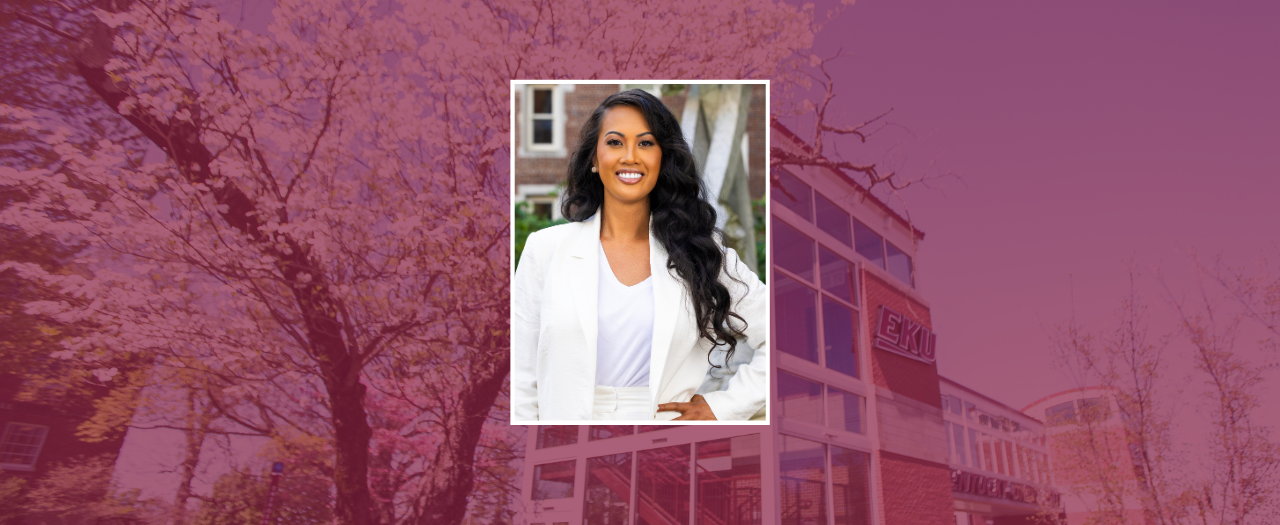International Acclaim for Medical Breakthrough
For Dr. Annabelle Manalo-Morgan, ’06, life’s dance with adversity offered her a gift—ultimately leading to a scientific breakthrough, which saved her son’s life.
Dr. Annabelle’s first major experience with adversity, however, presented itself when she came to EKU as a displaced student from Hurricane Katrina.
“We did not know the impact this storm was going to have on the city and in all of our lives, but obviously it was devastating,” she said.
Originally from Canada, Dr. Annabelle had been living out her dream of playing college basketball at Dillard University in New Orleans. After evacuating the city and not knowing where to go next, she made the decision to head to Kentucky when she heard U.S. President Bush recognize EKU as a transfer destination for students affected by Katrina.
“I could have gone back to Canada, or I could have just been depressed about not playing basketball and not having a degree. But EKU fueled me and gave me a place where I wanted to finish. The sense of community and the support was incredible,” she said.
Dr. Annabelle loaded up on credits to graduate in 2006 with a degree in biology. She went on to earn a Ph.D. in cell and developmental biology at Vanderbilt University.
A decade after she graduated from EKU came the hardest day of her life when her 28-day-old son underwent a nine-hour surgery to remove 40% of his brain.
Macario, the third of Dr. Annabelle’s five children, suffered a stroke at birth and endured hundreds of seizures a day as a newborn.
“They tried everything, and nothing was working,” she said. The family ultimately decided to proceed with the surgery to target the area responsible for the seizures from creating what Dr. Annabelle called the “kindling effect, which is basically a domino-like effect of the brain training other areas.” While the surgery helped to manage the seizures, Dr. Annabelle felt troubled by the fact that Macario hadn’t progressed from newborn development by six months old.
“Coming from a neuroscience background was just an absolute gift because I knew that the brain at such a young age should be rapidly developing and adapting to abnormalities,” she said. Dr. Annabelle began researching and experimenting and ultimately, formulated a medicine for Macario, using a compound from cannabis CBD.
“Two months after that, he’s crawling,” she said. “By 14 months, he’s walking, and today, he’s eight and he’s perfect. He is still missing 40% of his brain, but he has absolutely overcome because he is doing things that the area he is missing is responsible for. He is an absolute miracle.”
Dr. Annabelle first publicly shared her son’s story by happenstance at a conference where her husband—a Grammy-award winning musician—was performing. The story quickly spread when Forbes published an article about cannabis titled, Crafting Cannabis: A Modern-Day ‘Lorenzo’s Oil.’
Dr. Annabelle authored a book, “Mighty Flower,” and continues to share her story worldwide. As a research consultant, she strives to bridge the gap between modern-day and ancient medicine and uses global collaborations to help get new medications to market. She’s working on studies ranging from pain studies in the United Kingdom to heart disease at Vanderbilt to cancer studies in California to autism in the Philippines. Despite her busy schedule, she remains driven to “see more stories like my son.”
From her unpredictable landing at EKU where she learned the value of community to now global accolade, Dr. Annabelle said, “I can give you an example of every moment in my life that was probably not my plan, but the path has just made me stronger.”
